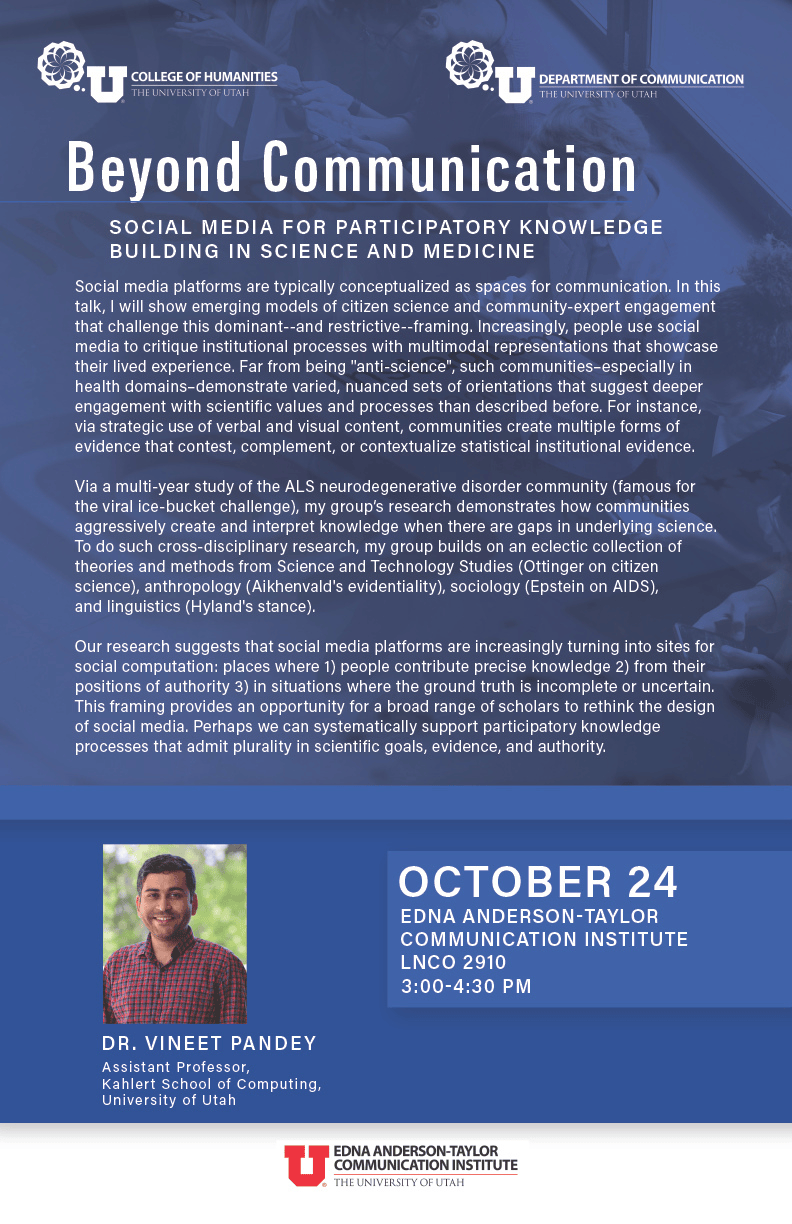Beyond Communication
Beyond Communication: Social Media for Participatory Knowledge Building Science and Medicine
Date: Thursday, October 11, 2024
Time: 3:00 - 4:30 PM
Location: Edna Anderson-Taylor Communication Institute, LNCO 2910

Dr. Vineet Pandey, Assistant Professor in the U's Kahlert School of Computing, will present "Beyond Communication: Social Media for Participatory Knowledge Building in Science and Medicine"
Social media platforms are typically conceptualized as spaces for communication. In this talk, I will show emerging models of citizen science and community-expert engagement that challenge this dominant--and restrictive--framing. Increasingly, people use social media to critique institutional processes with multimodal representations that showcase their lived experience. Far from being "anti-science", such communities-especially in health domains-demonstrate varied, nuanced sets of orientations that suggest deeper engagement with scientific values and processes than described before. For instance, via strategic use of verbal and visual content, communities create multiple forms of evidence that contest, complement, or contextualize statistical institutional evidence.
Via a multi-year study of the ALS neurodegenerative disorder community (famous for
the viral ice-bucket challenge), my group’s research demonstrates how communities
aggressively create and interpret knowledge when there are gaps in underlying science.
To do such cross-disciplinary research, my group builds on an eclectic collection
of theories and methods from Science and Technology Studies (Ottinger on citizen science),
anthropology (Aikhenvald's evidentiality), sociology (Epstein on AIDS),
and linguistics (Hyland's stance).
Our research suggests that social media platforms are increasingly turning into sites for social computation: places where 1) people contribute precise knowledge 2) from their positions of authority 3) in situations where the ground truth is incomplete or uncertain. This framing provides an opportunity for a broad range of scholars to rethink the design of social media. Perhaps we can systematically support participatory knowledge processes that admit plurality in scientific goals, evidence, and authority.
About Dr. Pandey
Dr. Vineet Pandey is a human-computer interaction (HCI) researcher and an Assistant Professor in the Kahlert School of Computing at the University of Utah. Beginning in Spring 2025, he will also serve as a Responsible AI Faculty Fellow at the university.
His research focuses on building human-centered computing tools that enhance the interface between communities and institutional experts, particularly in the domains of science and medicine. By supporting motivated communities in conducting scientific and medical work that is both personally meaningful and institutionally impactful, his work contributes to a deeper understanding of health, disorders, and public engagement in institutional systems. Through interventions at the levels of individual tools, social platforms, and institutional processes, his research has practical applications in digital health and citizen science.
All of his projects are grounded in close collaboration with real-world communities and institutional partners, with the goal of designing new methods for generating and acting on evidence.
